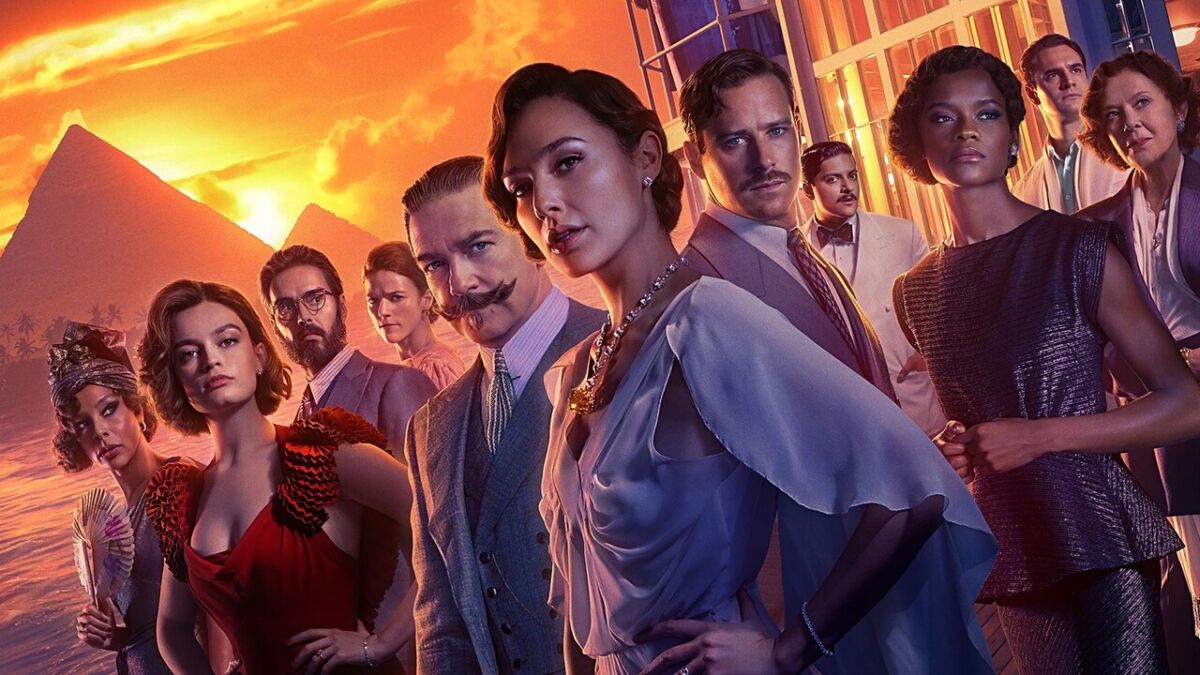If there’s one takeaway from Death On The Nile, it’s this: those who didn’t like Gal Gadot’s tone-deaf rendition of Imagine during the early stages of coronavirus will be downright furious that she spent the latter part on one of those film shoots that basically doubles as an expensive foreign holiday.
Sure enough, Death On The Nile is one of those lush, languorous productions where half the charm is in that escapism, in thinking for yourself what a nice holiday this would make – you know, murder aside. This is why you can perhaps forgive its plodding setup. Horror films traditionally have what’s called the ‘twenty minutes with idiots’ before people start dying. Here, that lasts almost a full hour.
Once it gets spun up, it’s on more reliable ground, going through the Poirot essentials of murder, revelations, more murder, more revelations, who dun this, who dun that, and of course finally gathering everyone in the accusation parlour to the tune of a lot of shocked gasping.
But in the land of the reaction shot, here our main man Poirot is definitely king. Practically every cut is likely to go landing on him for an immediate response, very often when there isn’t even really one to be had, so it more functions as a reminder that yes, he is still there.
There’s a rather clunky part when after an opening salvo of high-powered perception, someone turns the tables on Poirot by ragging on him for being vain. This doesn’t quite ring true addressed to the onscreen detective, but begins to make sense if you imagine it’s aimed toward the man playing him – Kenneth Branagh as Kenneth Branagh, directed by Kenneth Branagh, with an original soundtrack by Kenneth Branagh, based on the novel by Kenatha Branstie.
Meta-commentary like this can work, but you need to be pretty sure it does before filming it for millions of dollars and putting it on a big screen. Here, it’s just a distraction. Agatha Christie’s shtick was crimes and the people who solve them, not self-congratulatory little winks to camera.
We can probably blame the same tendency for the baffling decision to open Death Of The Nile with Poirot: The Beginning, not merely an origin story but the origin story of the Belgian sleuth’s moustache, of all things. The sheer audacity can perhaps save that part, but it’s reflective of a worrying tendency to turn a straightforward adaptation into a vanity project. Where Narcissus had the reflection in the water, Branagh has the camera.
It was this tendency that brought low the Benedict Cumberbatch version of that other beloved literary detective Sherlock Holmes – the mysteries themselves ended up being edged out by the creators’ inexplicable belief that the audience would be more interested in the character’s interminable backstory. There, it reached such depths that the fans theorised it was some kind of trick, since it couldn’t really be that crap.
Branagh’s Poirot, at least, has not plumbed such depths. Death On The Nile doesn’t have Poirot’s sassy sister coming to stay or anything like that.
Still, Branagh seems more interested in using Poirot as a jumping-off point to play a main character, rather than to actually play Poirot. Exactly how comic a figure Poirot is has ebbed and flowed between adaptations, but neither end of the spectrum felt the need to treat him so deadly-seriously as Branagh does, waving a gun around and shouting more than you’d expect or want.
And to gin up an extended backstory for Poirot is a misstep, or at least it is when it’s given such undue prominence. His job, both in-universe and as character, is to puzzle out the mystery – anything else is a distraction, especially when our examination of Poirot is coming at the expense of examining the various murder suspects.
Ironically for anything with Russell Brand in the cast, it’s Armie Hammer who shines here as a rakish Englishman. Based on his performance, he’d slot right into any number of turn-of-the-century (last century, that is) drawing-room dramas. And Brand himself isn’t half bad as a lovelorn doctor – his impressive ability to shed his usual troubadour persona simply left me thinking he was underused.
In fact, you could say the same of pretty well all the supporting cast. Really, in a production like this, they should all be getting their own little introductory scene where we get a grasp of their character and motives – not have it all rattled off second-hand by Poirot’s mate. Especially when they’ve gone to the trouble of assembling what is tritely called an all-star cast. If you will get in French and Saunders as a duo then for goodness’ sake, at least actually give them something to do.
And despite this whole skating-over of the non-Branagh cast, again, it takes a remarkably long time for it to actually start going. A two-hour film simply does not need fully half its runtime devoted to setup, even given the amount of establishing shots it has to fit in somewhere. This is a story with some delightful scenery built right into it, which is used in quite a charming way – and which you might have hoped would be enough of a perk to attract actors cocksure enough to claw back a bit of screen time from the unstoppable force of their director and co-star.
READ MORE: 12 Best Mystery Books For Teens
Some of the coverage you find on Cultured Vultures contains affiliate links, which provide us with small commissions based on purchases made from visiting our site.


